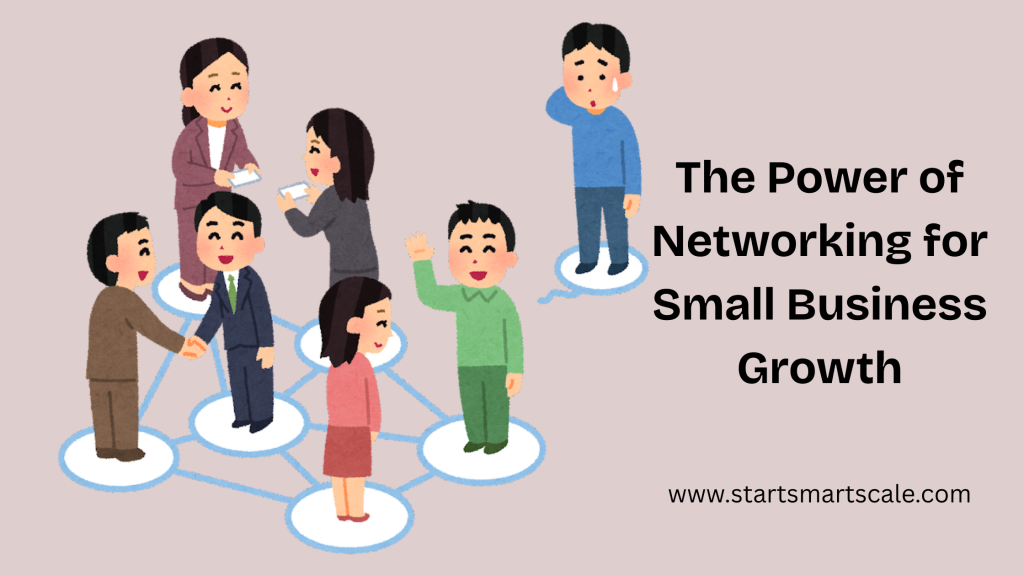In business, it’s not just what you know, it’s who you know? For small business owners, the right connections can open doors to opportunities, clients, and partnerships you never thought possible. Networking is not just a skill, it’s your secret weapon for growth.

Introduction – Why Networking is a game-changer for small businesses?
Networking is more than just swapping business cards. It’s about building genuine relationships that can open doors. For small businesses, networking can mean finding new customers, mentors, or even investors. In today’s competitive world, growth is very hard with building a connections.
Whether, you are just starting or have been in business for years, the right network can help you:
- Gain referrals
- Learn from other entrepreneurs
- Access opportunities that other miss
The Role of Networking in Driving Small Business Success
Did you know, networking is like planting seeds? You may not see results right away, but over time, these connections grow into valuable relationships.
How Networking Helps Small Businesses?
The following factors shows the importance of networking to grow small businesses.
Build Trust
People prefer to work with those they know and like.
Share Resources
Networking can lead to shared marketing costs or supplier discounts.
Gain Insights
Learn from other business owners’ experience.
Find opportunities
New partnerships, clients, often come when you attend business events. Here, you meet with other professionals and learn some marketing strategies.
Networking Tips for Small Business Owners to Boost Growth
The following are effective networking tips for small business owners.
Be Authentic
People can tell when you are only there to sell. Showing genuine interest in others and listen more than you talk.
Perfect Your Elevator Pitch
Be ready to introduce yourself in 30 seconds. Further, share what you do, who you help, and how you are different.
Join Both Online and Offline Events
Attend local meetups, trade shows, and online webinars. Each setting offer different benefits and connections.
Follow Up
Send a quick email and LinkedIn message after meeting someone. This simple strategy can turn a casual chat into a long-term relationship.
Online Networking Tips for Small Business in the Digital Age
The internet has made networking easier than ever. Here’s how to network effectively online.
Use LinkedIn
- Create a complete profile with a professional photo.
- Join industry-specific groups.
- Share insights and comment on other people’s posts.
Engage in Facebook Groups
- Join groups where your ideal customers hang out.
- Offer helpful advice without directly selling.
Host Webinar or Live Sessions
- Position yourself as an expert.
- Invite other professionals to co-host.
Be Consistent
- Online networking takes time.
- Post regularly and engage with others weekly.
How to Find Networking Opportunities in Local Community?
In person networking still has power. Here’s where you find opportunities.
Chamber of Commerce
Most town have one. They host mixers and business expose.
Trade Shows and Industry Events
These are great for meeting potential clients and suppliers.
Workshops and Seminars
Educational events often attract motivated professionals.
Volunteer Activities
Helping your community can connect you with people who share your values.
Leverage Networking for Collaboration and Partnerships
Networking is not just for finding customers. It’s also a great way to find business partners.
Find Mutually Beneficial Relationships
Work with businesses that complement yours. For example, a wedding photographer could partner with a florist.
Collaborate on Marketing
Share social media posts, co-host events, or run joint promotions.
Explore joint Ventures
Team up on a product or service launch to reach a wider audience.
Common Networking Mistakes Small Business Owners Should Avoid
Networking can fail if you make these mistakes.
Being Too Sales-Focused
Nobody likes being pitched to constantly. Therefore, you need to build trust first.
Not Listening
Ask questions and pay attention to answers.
Failing to Follow Up
Connections fade if you don’t stay in touch.
Only Networking in one Place
Don’t limit yourself to the same events. Pay attention to new groups and platforms.
Tracking the ROI of Your Networking Efforts
You should know if your networking is working.
Set Goals
Decide, if you want leads, referrals, partnerships, or brand awareness.
Use a CRM
Track contacts, conversations, and follow-ups.
Measure Growth
Look for partners to increase sales after attending certain events.
Case Studies – Real Life Examples of Networking Success in Small Businesses
Case 1 – Local Bakery Finds Corporate Clients
- A small bakery attended local chamber events.
- They connected with a catering manager from a large company.
- Within months, they had regular corporate catering orders.
Case 2 – Tech Startup Gets Investors
- A tech founder attended a startup networking night.
- They met an angel investor interested in their idea.
- This led to funding and a successful product launch.
Conclusion
Networking is not a one-time task. It is an ongoing effort that builds your reputation and open doors. So focus on your observation and start smart. Attend one event or join one online group this month. Follow up with the people you meet. The more genuine connections you make, the stronger your business will grow.






